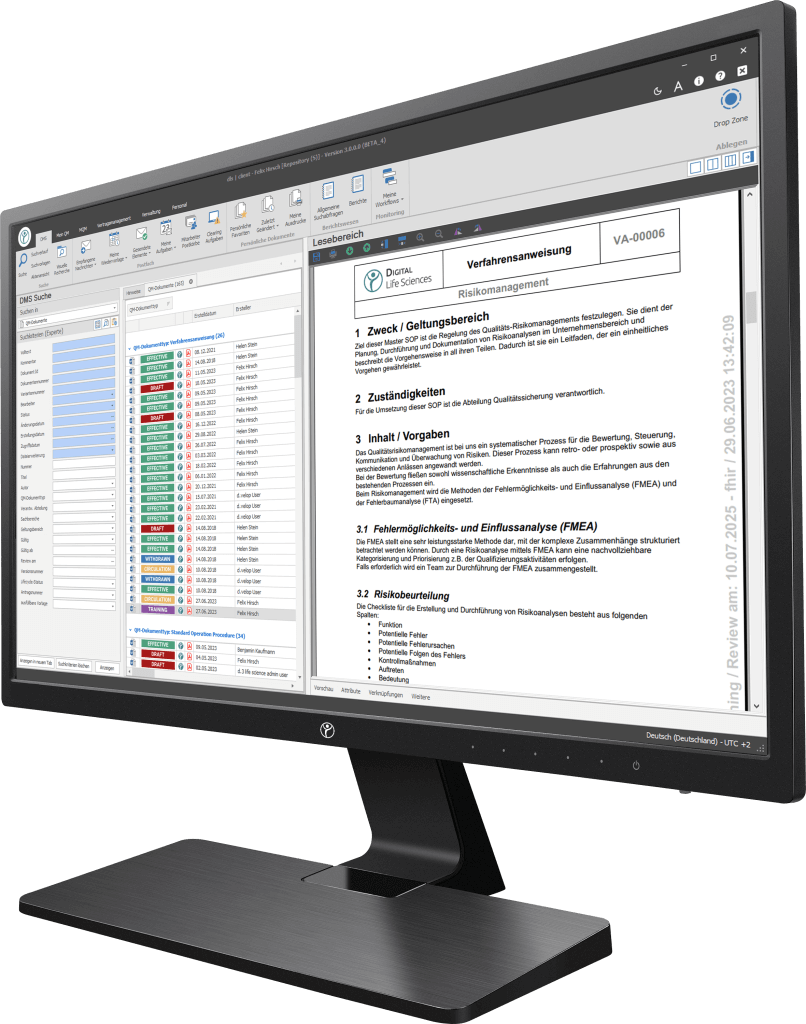Definition of the term (“What is ISO 9001:2015?”)
ISO 9001:2015 is an international standard for quality management systems. It specifies the requirements that an organization must meet in order to implement and maintain an effective quality management system. This standard applies to organizations of all sizes and in all industries. It emphasizes the significance of customer focus, leadership, employee engagement, process orientation, continuous improvement, and evaluation of risks and opportunities.
What requirements must organizations meet for ISO 9001:2015?
- The specification of quality objectives and the implementation of measures to achieve these objectives.
- The implementation of a documented quality management system that defines the processes and responsibilities.
- Monitoring and measuring processes to ensure they are effective.
- Evaluating customer requirements and ensuring customer satisfaction.
- The continuous improvement of processes and the quality management system as a whole.
What should be considered when implementing ISO 9001:2015?
- Leadership and engagement: An effective leadership is the foundation of a successful QMS.
- Planning: Strategic planning is critical to aligning your QMS with your organization’s goals.
- Support and resources: To achieve quality goals, you need the right resources and support.
- Operations: Efficient operational processes are the focus of ISO 9001:2015.
- Performance evaluation: Monitoring and measuring performance is of critical significance.
- Improvement: Continuous improvement is key to maintaining and improving your QMS.
Your path to digitization — Discover our software
Our digitization solutions primarily address document-based processes in manufacturing, production and quality management. The basis of the dls | eQMS is a holistic ECM/DMS system. The ECM/DMS system can be connected to your existing ERP system (e.g. SAP) and, thus, map almost all document-based processes in the company.

What are the benefits of an ISO 9001:2015 certification?
ISO 9001:2015 compliance can help companies to improve the quality of their products and services, reduce costs, build customer trust, and increase their competitiveness. It is important to note that the standard is updated regularly, so organizations should ensure that they are always using the latest version to meet the requirements.
What needs to be kept in mind with the latest revision of ISO 9001:2015?
The last revision of the standard took place in 2015 (ISO 9001:2015). It is the fifth edition of the ISO 9001 standard, which specifies the criteria for a quality management system (QMS). Among other things, this states that processes must be validated which cannot be monitored during their creation and where the result only becomes evident in the end. Accordingly, the components supporting this process, including the software, must also be validated. It is stated here that documented information including those using software must be identifiable and assignable, have an adequate format and must be subject to a respective validation and approval. The subject of regular control of all data and documents and their management is also given appropriate consideration in this standard.
Conclusion
In summary, ISO 9001:2015 is not just a standard; it is a commitment to excellence. By adhering to its principles and implementing a strong QMS, organizations can increase customer satisfaction, optimize operations and ultimately achieve their business goals. If you want to establish a culture of quality in your organization, ISO 9001:2015 is your guide to success.
Start your digital transformation with our powerful, modular software solutions
Frequently Asked Questions (FAQs)
What is ISO 9001:2015 and why is it important?
ISO 9001:2015 is an international standard for quality management systems. It is important because it helps organizations to improve their processes, increase customer satisfaction, and achieve operational excellence.
How long does it take to implement an ISO 9001:2015?
The time required for implementation varies depending on the size and complexity of the organization. On average, it can take several months to a year or longer.
Is the ISO 9001:2015 certification mandatory?
The ISO 9001:2015 certification is not mandatory, but many organizations choose to pursue it to demonstrate their commitment to quality.
What are the costs associated with an ISO 9001:2015 certification?
The cost of an ISO 9001:2015 certification can vary widely depending on factors such as the size of the organization and the complexity of its processes. They include costs for consulting, training and certification audits.
Can small businesses benefit from ISO 9001:2015?
Yes, ISO 9001:2015 can benefit small businesses by helping them to improve their processes, gain a competitive advantage and build customer trust.
Who carries out the ISO certification?
The certification of the standards is carried out by notified bodies, such as TÜV.
